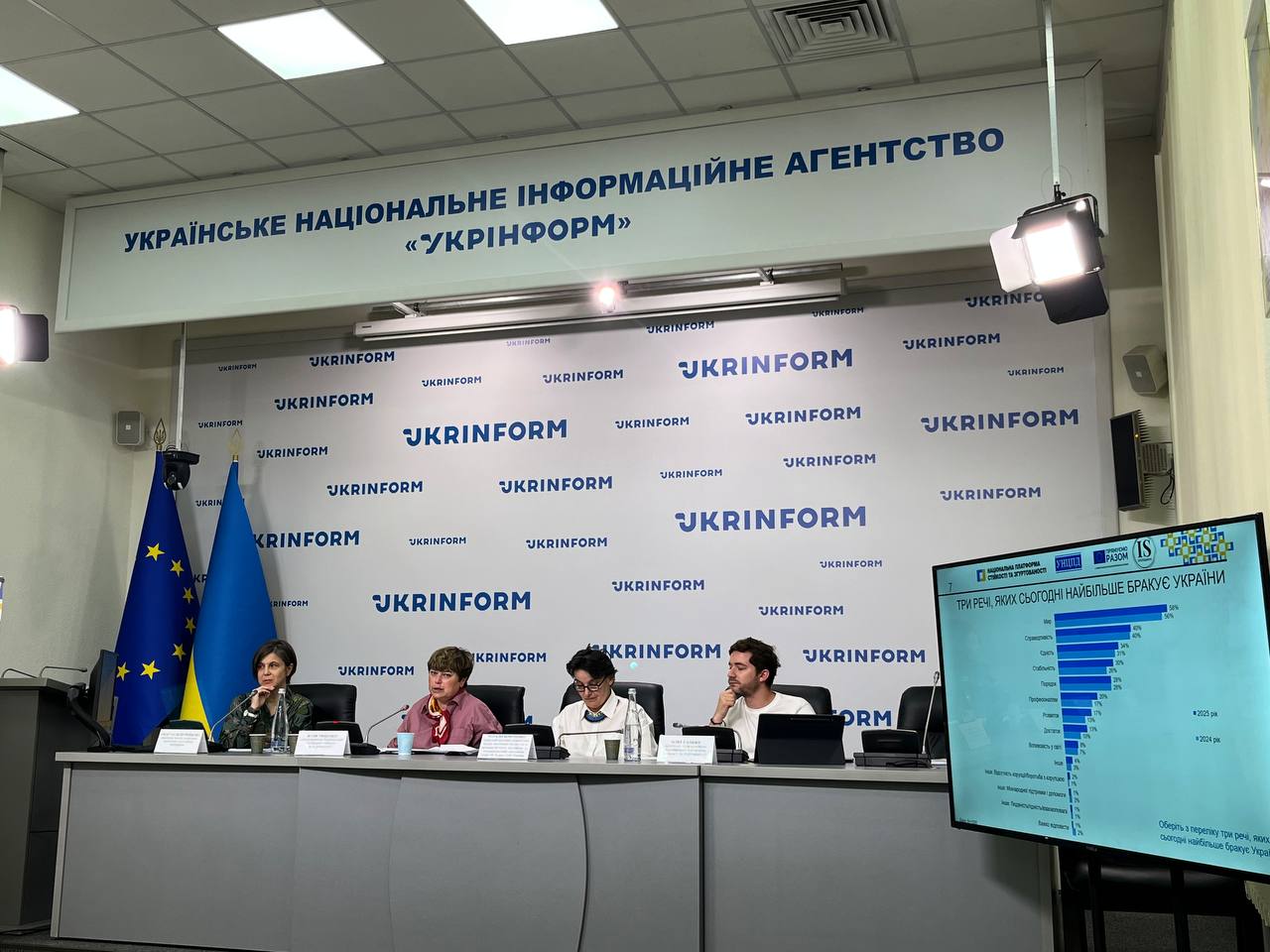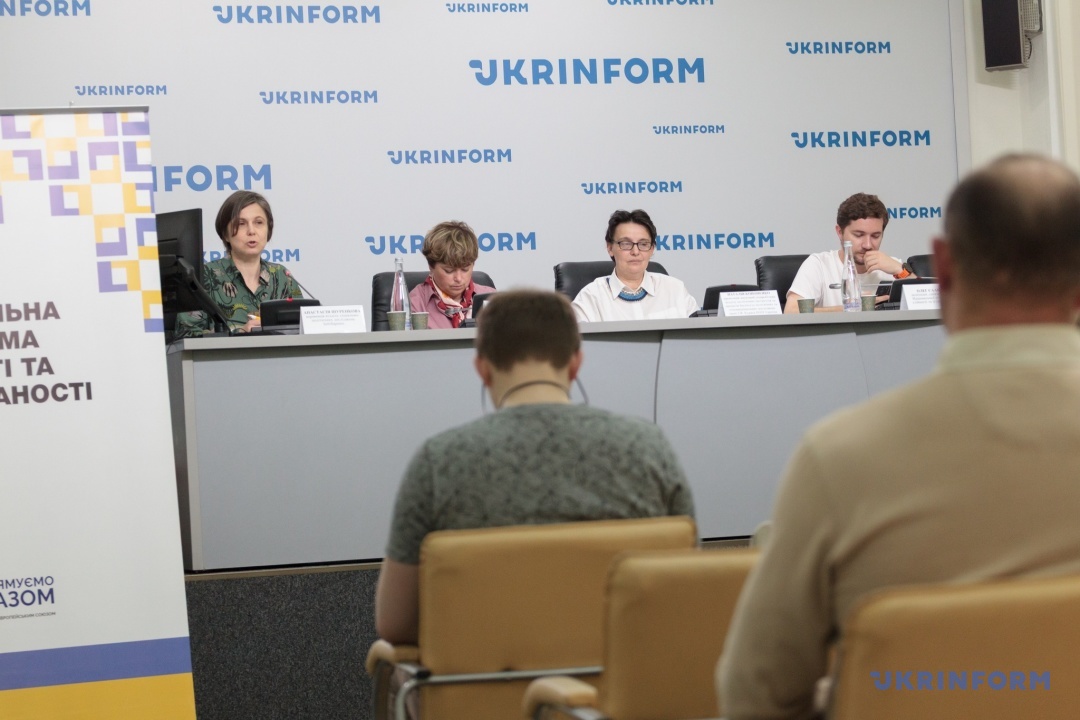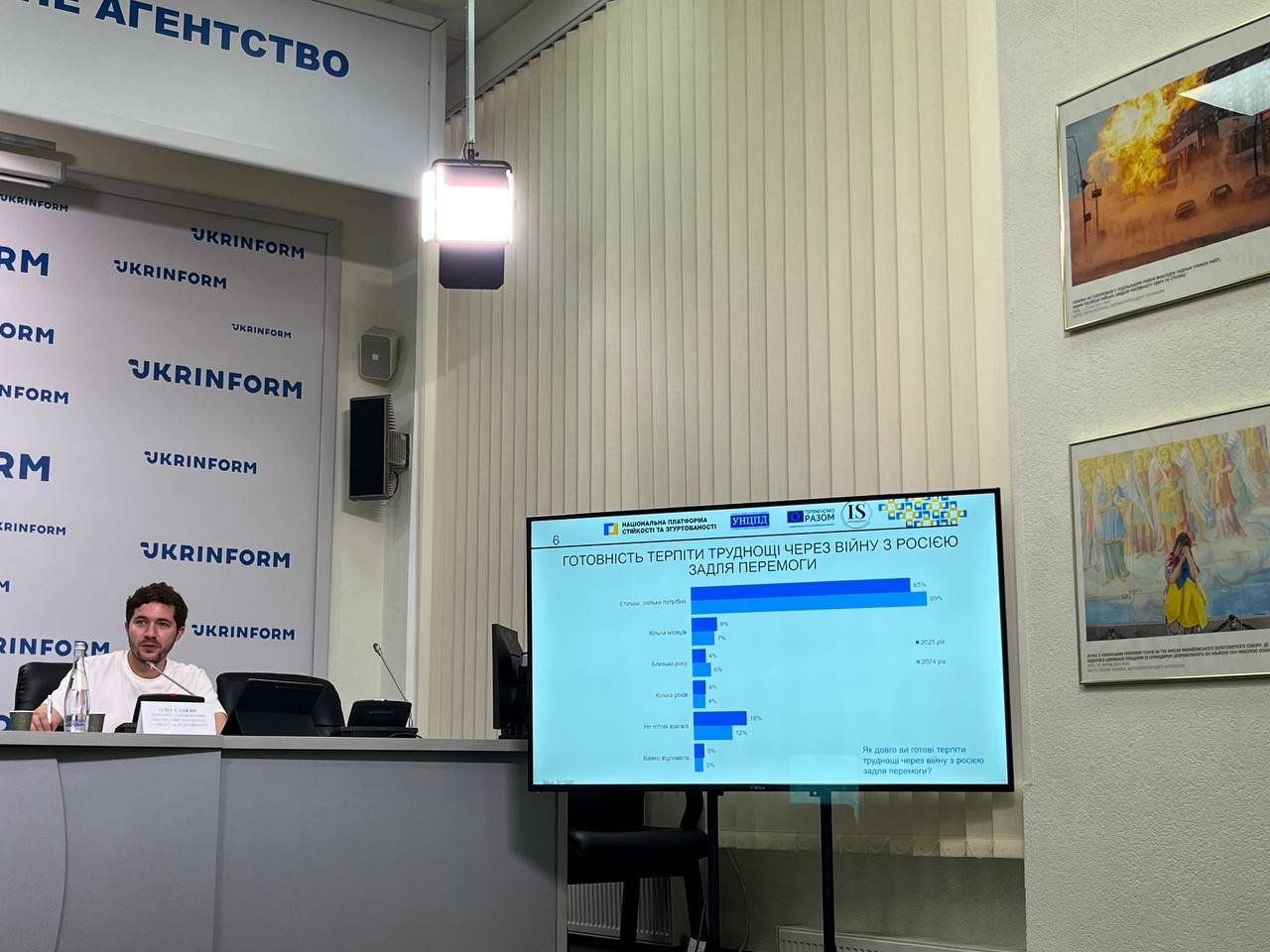Despite the fourth year of full-scale war, most Ukrainians remain resilient thanks to the support of the Armed Forces, loved ones, and faith. At the same time, there is a growing demand for development, justice, and effective interaction with the government.
This is evidenced by the results of a sociological survey conducted by Info Sapience and presented at Ukrinform.
The data obtained during this year's omnibus survey was compared with the data for 2024. The survey was conducted by the Info Sapience research agency for the National Platform for Resilience and Cohesion at the request of the Ukrainian Center for Independent Political Research.

The co-founder of the National Platform, Yuliia Tyshchenko, emphasized that the main goal of the survey was to assess the level of resilience in terms of its various parameters. The researchers recorded not only the current state of society, but also its capacity.
Anastasiia Shurenkova, Head of the Social and Political Research Department at Info Sapience, spoke in more detail about the results. The sample consists of 1000 respondents and is representative of the population of Ukraine. The interviews were conducted by phone in April 2024 and 2025. The maximum margin of error does not exceed 3.1%.
As in the previous year, the majority of Ukrainians are strengthened by their faith in the Armed Forces (64% in 2025, 65% in 2024). Family and close relatives are in second place (52% in 2025, 49% in 2024). In 2025, "religion/belief in God" ranks third among the factors (+7 points compared to 2024: 28% and 21%, respectively).

In 2025, as in 2024, the vast majority of the population remains confident in winning the war, although the share of optimistic Ukrainians has decreased by 5 points: 43% (2025) to 47% (2024). Similarly, in 2025, the majority of respondents (65%) are ready to endure difficulties for the sake of victory as long as necessary. But last year, this figure was 4 points higher (69%). The number of those who are not ready to endure at all has increased by the same 4% (16% in 2025, 12% in 2024).
Answering the question of what Ukraine lacks the most now, respondents could provide three answers. The top three were peace (58% in 2025, 56% in 2024), justice (40% in 2025 and 2024), and unity (34% in 2025, 31% in 2024). Anastasiia Shurenkova emphasized that this year the demand for development has begun to "gain momentum."
When assessing the level of trust in institutions, Ukrainians consistently prefer the Armed Forces (69% in 2025, 71% in 2024), which is also the basis of personal resilience. This year, trust in volunteer movements has slightly decreased (42% - in 2025, 47% - in 2024), but trust in the President of Ukraine has increased (34% - in 2025, 27% - in 2024).
The majority of respondents feel that they are primarily citizens of Ukraine. And this figure is significantly higher in 2025 compared to 2024: 56% and 52% respectively.
As before, in 2025, Ukrainians believe that the effectiveness of interaction between residents and local authorities has decreased compared to the time before the full-scale invasion (48% consider interaction effective today, and 54% before the full-scale invasion). The share of those who consider such interaction "completely ineffective" has increased from 15% in 2024 to 21% this year.
It is also noteworthy that the number of respondents who believe that distrust of local authorities is an obstacle to effective interaction has also increased (29% in 2025, 25% in 2024). However, corruption remains the main obstacle, which is also documented in other studies.
Among the priorities on which local authorities should focus their efforts, the first place is occupied by assistance to the Armed Forces, but this indicator has significantly "slipped" compared to last year: 39% and 4.6% respectively.
Instead, the urgency of addressing development-related issues has increased, including assistance to refugees and IDPs, rebuilding damaged infrastructure, and developing local youth, among others.
In 2025, the number of Ukrainians who participate in public life when they believe their participation is needed increased: 58% and 52% respectively. At the same time, the share of those who help only when asked has slightly decreased: 26% in 2025 and 29% in 2024. The researcher believes that this is evidence of proactivity: people are ready to engage in socially useful activities on their own decision, without waiting for a separate request.
As for the forms of participation in public life, financial support is the most common this year and last: 49% in both surveys. Not participating in public life is 28% in 2025 and 27% in 2024. If this figure is subtracted, it turns out that three-quarters of Ukrainian citizens are socially active, which is very encouraging for the fourth year of a full-scale war.
Commenting on the survey data, Yuliia Tyschenko noted that the absence of negative changes indicates a certain hardening of Ukrainian society. The expert attributes the increasing role of religion as a factor of individual resilience to the growing fatigue of searching for solutions that can be influenced by the individual. The majority of Ukrainians are confident in Ukraine's victory, but the interpretation of the concept of "victory" may differ. Some people consider the destruction of the aggressor country to be a victory, while others consider the ceasefire to be a victory. The same applies to the concept of justice.
If we take into account the age distribution, it is young people who say that Ukraine lacks development. Instead, the elderly have a greater need for stability and normalization of life.
Natalia Kononenko, a leading researcher at the Department of Political Institutions and Processes at the Kuras Institute of Political and Ethnic Studies of the National Academy of Sciences of Ukraine, drew attention to the large gap between faith in the Armed Forces and faith in the state. According to Ukrainians, the state does not perform all functions effectively enough, except for security.
The expert noted that the level of trust in most institutions is below 13%. High trust in the leaders of the rating (the Armed Forces, volunteers, and the President of Ukraine) is not enough to compensate for the lack of capacity of the rest. Thus, even in the face of war, the government should gradually return to domestic policy.
Ukrainians are ready to endure difficulties for the sake of victory as long as necessary, but the gradual decline in this indicator is an alarming signal. This is the opinion of political scientist and co-founder of the National Platform Oleh Saakyan. He also noted that the emotional state of society, which has a high demand for justice, cannot be ignored.

The political scientist believes that the need for peace to some extent indicates the need for certainty and stability. When a war of attrition is going on, people strive not only to survive, but also to live in such conditions.
It is worth reminding that the National Platform recently presented a study on this topic - "Promoting the development of deliberative democracy tools in the context of limited local government capacity"
Read also: Concept for improving the humanitarian aid accounting system presented in Ukraine: UCIPR experts on key changes
Photo: Ukrinform and UCIPR
